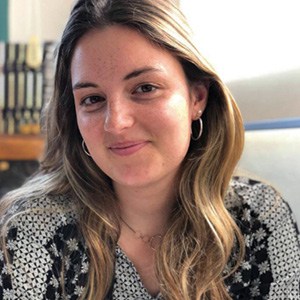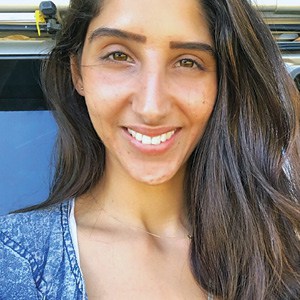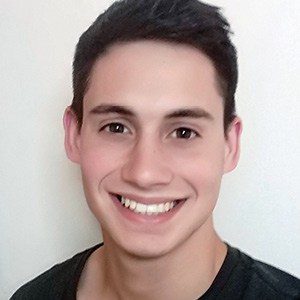Just as watermelon and humid nights are perfect pairings, so too, are summer days and campers.
But, while summer shows up each year, ready or not, attending camp takes some planning—which explains why this section is called, Getting Ready for Summer.
Each year, I marvel at the vast options available for area families when it comes to choosing a day camp. Whether a child gravitates toward art or sports, toward super heroes or acting, toward cooking or hiking, there’s a camp in Tidewater that will certainly check the box.
For families on the hunt for a place for their child, or perhaps for a place for their teen to work as a counselor or counselor-in-training, I hope you find some ideas within these pages.
Whether camp is part of your summer or not, when the days are done and it’s time to fire up the grill, consider the recipe on page 20 for a different take on eggplants, sometimes referred to as the “Jewish apple.” This dish makes a great side to grilled meats, fish, and other vegetables.
In the meantime, I hope you enjoy these glorious days of spring!
Terri Denison
Editor
New director for JCamp at the Simon Family JCC

Eliana Rohrig
JCamp’s new director, Eliana Rohrig, has spent a lot of time at camp—as a camper, counselor, and division head—primarily at Camp Ramah in Nyack, N.Y. She spent a semester studying at Hebrew University in Jerusalem, served on Chabad’s General Board in Binghamton, N.Y. and volunteered with Hillel, also in Binghamton. Rohrig teaches at Park Avenue Synagogue in New York City and is an interviewer for Birthright—Israel Free Spirit. She joins JCamp at the Simon Family JCC later this month.
“We are so excited that Eliana will lead JCamp.” says Betty Ann Levin, UJFT executive vice president. “Her energy and ideas are just terrific. We can’t wait for her to arrive.”
Jewish News: What attracts you to camp?
Eliana Rohrig: What attracts me to camp is the intentional community that is created to keep a kid’s mind, body, and soul engaged during the summer time.
Summer is an amazing opportunity to express parts of our identities that do not always have the space to fully ‘breathe’ during the year. Whether it’s dance, sports, singing during lunch, or getting over the fear of the deep end of the swimming pool, camp is a place where children grow and are encouraged to be their best selves.
Camp is a place where it is safe to take risks. Part of the reason this is the true is because parents trust camp counselors to nurture and guide their children, which is both empowering for the counselors and exciting for the campers to have great role models.
JN: What attracts you to Jewish camp, in particular?
ER: I find that Jewish camp is a powerful educational tool to show how joyful it is to live an active Jewish life! My experiences growing up at Jewish summer camp gave me fantastic Jewish friends, Jewish role models, and an uplifting Jewish community.
JN: What do you hope to bring to JCamp?
ER: I hope to bring energy and enthusiasm to JCamp. I love summer, I love camp, and I love being Jewish. Nothing makes me happier than seeing tired smiling faces at the end of a jam-packed camp day and I can’t wait to be part of the JCamp story for Kayitz 2019.
JN: Do you have a favorite day camp memory?
ER: I think my favorite day camp memory was my first summer as a camp counselor on Trip Day taking my bunk of girls down water slides and watching their confidence levels soar as they experienced that exhilarating adventure together.
JN: Other than your time in Israel, you’ve spent the majority of your life in New York. So, how do you feel about spending the summer in Virginia?
ER: Yes, I am a true New Yorker and have never lived outside of a city! Driving to work every day will be a new experience for me, since I take the subway every day. I am truly so excited to be near the beach, have opportunities to hike on the weekends, and get to know the personality of Norfolk and Virginia Beach.
JN: Is there anything you’d like the Jewish community to know about you?
ER: I would love for them to know how excited I am to meet different community members and how much I appreciate how welcoming everyone has been so far. That is exactly what is so wonderful about being Jewish, no matter where you go in the world, you have people excited to meet you and learn from you. I am beyond grateful for that and know I have so much to learn from all of you.
Your favorite cooking shows are finding young chefs at Jewish summer camps
 (JTA)—Zach Atlas has been going to camp about as long as he’s been baking.
(JTA)—Zach Atlas has been going to camp about as long as he’s been baking.
During the summer, Atlas, 14, is at Ramah in the Berkshires, a Conservative Jewish camp in Wingdale, New York, with swimming, sports, and Hebrew programs. During the year, he’s often at his oven, making pumpkin muffins or chocolate and peanut butter cake.
As a noted camper and foodie, how does he feel about his camp food?
“It’s awful,” he says. “It’s so bad. Except for some days. They have cinnamon rolls and coffee cakes on Saturday. Otherwise it’s always so bad, and they always have this survey, and I don’t see the point of it because it never gets better.”
Camp wouldn’t be camp if kids didn’t complain about the food. So how is it that Jewish camps have managed to produce campers, current and former, who have competed on top television cooking shows?
Atlas was on the Kids Baking Championship last year on the Food Network. Tal Schulmiller appeared on Fox’s MasterChef Junior this year. And Sara Bradley was the runner-up on Bravo’s Top Chef this year.
And even though they acknowledge that their camp food wasn’t exactly haute cuisine, they say camp has played a role in shaping their cooking.
“Most of the Camp Ben Frankel food was bad,” Bradley, 37, says of the Jewish camp she attended in southern Illinois as a kid. But memories of baking challah there have stuck with her.
“It was so amazing to take this bread, fold it up and braid bread together,” she says. “As a little girl, you learn to braid hair, but you never knew you could do that with bread.”
Bradley reached the final episode of Season 16 on Top Chef, which aired in March, thanks in part to the matzah ball soup she made with her mother while filming in Macau. The chicken thighs with matzah balls in savory mushroom consomme wowed the judges, and Bradley’s mother taught her that club soda can make matzah balls lighter.
“It was far from the soup you get in your mother’s home, but it was really delicious,” she says.
Bradley also brings traditional Jewish foods into freight house, her restaurant in Paducah, Kentucky, where she grew up. When she puts traditional Jewish foods on the menu, she’ll often make them with a local twist, or give them names that are more understandable to her customers in Appalachia. So, she has served matzah balls, for example, as “bread dumplings.” And latkes with apple butter, a local spread, or pulled pork mixed in.
“We’ve had kugel, but people know it as a baked egg noodle casserole,” she says. “We use a lot of Israeli spices like zaatar, but people don’t always know that.”
Some Jewish camps have taken note of the culinary craze and launched cooking programs and specialty camps geared to the kitchen. New Jersey Y Camp’s two facilities for Orthodox kids, Camp Nesher and Camp Shoshanim, have offered a kosher culinary arts camp with the noted cookbook author Susie Fishbein as the instructor. The Louisville, Kentucky-based Camp J offers a range of cooking specialty camps, including a week of cupcake baking.
Camp Zeke in Lakewood, Pennsylvania, puts “culinary arts” right into its logo, and has a dedicated teaching kitchen where resident chefs train campers in cooking techniques and culinary theory.
Atlas, who lives on Manhattan’s Upper East Side, hopes to work professionally as a baker when he’s older, though he thinks running his own bakery may be too stressful. He started baking thanks to his mom, who would bake zucchini and pumpkin muffins, as well as a delicious blueberry pie. Now his favorite thing to do is bake cake.
“They’re a really great blank canvas to try something new on and decorate,” he says.
Atlas was eliminated from the Kids Baking Championship in the first episode last summer, in which contestants had to make eclairs. But he’s still baking, posting a blue “winter wonderland cake” to Instagram last month.
Schulmiller, 14, from suburban Long Island, became interested in cooking via matzah ball soup from his grandmother. On MasterChef Junior, whose seventh season began in March, he made his signature dish, a kombu-cured salmon with a miso buerre-blanc and yuzu kosho, a Japanese chili paste. He’s also a foodie in his spare time in New York, rarely visiting the same restaurant twice, so he can sample the city’s culinary landscape.
But though Schulmiller feasted on lobster cappuccino at Le Bernadin, the famed New York seafood restaurant, for his birthday, he also enjoys traditional Jewish holiday cooking. He contributed to cooking for Passover, and loved making Thanksgiving dinner this year.
“For Thanksgiving I made half of the dishes,” he says. “I love cooking for a crowd. I like having a lot of people over so I can cook for them.”
Oh, and another thing: Schulmiller didn’t think the food at his summer camp, Camp Havaya in Pennsylvania, was all that bad. He attended for two full summers.
“I liked it at the time,” he says. “If I were to go back, it would probably stand up. We were lucky to have a good team in the back.”
This article was made possible with funding by the Foundation for Jewish Camp. The story was produced independently and at the sole discretion of JTA’s editorial team.
Ben Sales
What it’s like to be a non-Jewish counselor at a Jewish summer camp
(JTA)—A few years ago, Joe Gurski had never met a Jewish person and knew little about Judaism apart from things he had seen on television. Today the 24-year-old, who lives in Manchester, England, has many Jewish friends and can recite Shabbat prayers in Hebrew.
Gurski, who grew up Catholic, but now identifies as agnostic, learned all this while working as a counselor at Camp Wise, a Jewish summer camp in Chardon, Ohio.
“I was able to recite the prayers really well, and I was probably saying them louder than the kids were,” he recalls of his first summer as a counselor in 2015.
Gurski is among a number of non-Jewish counselors—many of them international—who learn about Judaism through working at Jewish camps in the United States.
Jodi Sperling, a senior consultant on overnight camping at the JCC Association of North America—it runs a network of 120-day camps and 24 overnight camps, including Camp Wise—estimates that 5–8 percent of staff at its overnight camps are not Jewish.
Some of the international counselors, such as Gurski, learn about the camps through organizations that match young people with camps looking to hire staff, such as Camp America.
Sperling says that having international non-Jewish staff provides a learning experience both for campers, who are exposed to new cultures, and the counselors.
“[A]n outcome of having non-Jewish staff working at our camps is that our camps then become educators of people who are going out into their communities and becoming advocates of Jews and of Israel,” she says.
Alejandro Padron, a 21-year-old from Venezuela, is an example of such an advocate. The university student, who is Catholic, had some familiarity with Judaism prior to working at his first Jewish summer camp in 2016.
He had learned about the Holocaust and even gave a speech at his school in a ceremony for International Holocaust Remembrance Day. But working at two Jewish camps—Camp Inc Business Academy in Steamboat Springs, Colorado, and Camp Mountain Chai in Angelus Oaks, California—made him want to get even more involved.
Since working at the camps, Padron has started volunteering at the Anne Frank Space, a Caracas-based organization, where he teaches about the Holocaust and tolerance. He said he was motivated by meeting people at camp who were descended from Holocaust survivors.
“To me it’s very natural and a very organic thing to do because I know people [whose relatives] have been through that,” he says.
Prior to working at camp, Padron had only met one Jewish person, so being immersed in the culture was a bit of a culture shock. He remembers arriving for his first summer at Camp Inc and being confused by Jewish rituals.
“We arrived on Shabbat,” he recalls, “so we have the Shabbat dinner and all these celebrations we do at camp. I remember sitting there reading the prayers and being so scared because ‘[What] am I getting into?’”
Now Padron knows the grace after meals, blessings for food and prayers from the siddur—all in Hebrew.
“I really see myself [being] into this ritual and this content and promoting that with the kids,” he says. “It’s so enriching.”
Gurski, who worked at Camp Wise for five years—first as a video specialist, then as a counselor and finally as a supervisor—says celebrating Shabbat was the highlight of his weeks at camp.
“We get to reflect on the week and appreciate what we have and the fact that we’re at camp,” he says. “Friday night services is the time I felt most spiritual.”
Katie Plowright, from Oakland, California, also connected with Shabbat.
The 24-year-old, who grew up with Catholic and Buddhist traditions, got to experience Shabbat while working at Camp Tawonga in Groveland, California. She had attended a Jewish day camp as a child, but since it was not a sleepaway camp she did not get to experience Shabbat.
Unfamiliar with many of the Hebrew prayers, Plowright found new unique ways of connecting at Camp Tawonga.
“When people were singing these different prayers,” she says, “I would often take time to take the idea of Shabbat, which is a time for reflection, and I would instead say the prayers I would think about my past week and reflect and look forward towards the next week.”
Jenni Zeftel, director of Jewish day camp and strategic programs at the Foundation for Jewish Camp, says that while some families seek all-Jewish camps, others may look for an environment that reflects the diverse communities they live in.
“For camps that are looking to serve that kind of Jewish family or that part of the Jewish population, I think it’s really important that their staffing reflect that approach as well by including counselors and other staff members who don’t identify Jewishly,” she says.
Plowright says her presence at the camp also helped campers—Jewish and not—who were less familiar with Jewish rituals.
“[T]here are kids who go to Tawonga who aren’t Jewish, so I think for them it’s nice to have a face of somebody who was also not Jewish,” she says. “Or there are also kids who also don’t know all the prayers or songs.”
Padron’s experience was a bit different. In fact, many of the kids were surprised when they learned about his background.
“Sometimes they said they don’t believe me that I’m not Jewish,” he says. “But I was like, ‘Hey, I’m serious, I’m not Jewish. I really love doing these things, but I’m not Jewish, and that’s OK.’”
This article was made possible with funding by the Foundation for Jewish Camp. The story was produced independently and at the sole discretion of JTA’s editorial team.
Josefin Dolsten
Camp to welcome two Shlichim for the summer
Through The Jewish Agency for Israel’s Shlichim (emissaries) program, two Israelis are spending the summer at the Simon Family JCC’s JCamp. Always a special aspect of camp, each year, Shlichim learn about life in Tidewater, as well as about other parts of the U.S. While here, they teach about Israel and serve as living examples of Israelis for the campers, as well as the parents who interact with them.
This year’s Shlichim are Ofek Razon and Ofir Tabahnik, who recently wrote to introduce themselves.
To host one of the Shlichim for a week or two this summer, contact Jasmine Amitay at 757-965-6138 or jamitay@ujft.org.

Ofek Razon
Ofek Razon
I’m 22 years old and live in Hod Hasharon city—it’s like 20-minutes from Tel Aviv.
I really love to work out and try to go to the gym at least four times a week.
I will love to share Israeli culture/foods and a little bit of Hebrew words with the campers. The JAFI Shlichim program is a great platform that allows me to donate to the Jewish community around the world. I’m really look forward to meeting all the community members and to see your lifestyle as a Jewish community in the U.S.

Ofir Tabachnik
Ofir Tabachnik
I’m 21 years old from Moshav Shilat. It’s 30 minutes from Tel Aviv and Jerusalem.
My favorite sport activity is swimming. I participated in an event at the Sea of Galilee, where you swim from shore to shore. Besides that, I like hiking and trips. I am interested to share with you my experience and knowledge about Israeli culture. I chose to be on the Shlichim program so I would be able to do something meaningful, to contribute, and to meet the Jewish community abroad.
I look forward to meeting the community and to taking part in the camp this summer!
Grilled Eggplant with Chermoula Recipe…just in time for summer
The Nosher via JTA—From bulbous and egg-shaped to small and thin, the eggplant (or if you’re British like me, the aubergine) is a staple fruit within Sephardic Jewish cooking. Originating in India or perhaps even China, eggplant seeds are thought to have traveled along the Silk Road into the hands of Jews and Arabs as early as the 18th century. From there, eggplant has been used so often in Jewish cooking that some refer to it as the “Jewish apple.”
Eggplant is now enjoying a wonderful resurgence, particularly in Israel, where it is enjoyed in countless salads or served whole and roasted topped with meat, tabbouleh and often gobs of nutty tahini. No meal in Israel seems complete without a portion of smoky, roasted eggplant.
It’s so incredibly versatile: Eggplant can be stewed, stuffed, pickled, roasted or grilled. Historically known for its bitterness, modern varieties don’t necessarily require salting, although I always do just in case any bitterness remains, and especially when grilling, as this will reduce the amount of oil that is soaked up.
In this recipe I serve eggplant with a North African spice paste called chermoula, which is herby, rich, and pungent. This fantastic sauce is begging to be made when the weather is warm and the plates move outside.
Chermoula—a marvelous mixture of coriander, parsley, chili, paprika, garlic, cumin and olive oil—is a Moroccan, Tunisian, and Algerian mainstay. While it is traditionally served with fish, I love it with grilled meats, fish, veggies or even couscous.
Ingredients
- For the eggplant
- 3 medium eggplants
- 2 tablespoons fine sea salt, plus more for sprinkling
- ¼ cup olive oil
- For the chermoula
- 1 cup packed coriander leaves
- ½ cup packed parsley leaves
- ½ cup mint leaves
- 3 garlic cloves, peeled and roughly chopped
- ¼ cup preserved lemon juice or ¹/3 cup of regular lemon juice
- 2 teaspoons ground cumin
- 2 teaspoons ground coriander
- 1 teaspoon sweet paprika
- 2 teaspoons harissa paste
- ½ teaspoon cayenne
- ½ cup olive oil
- Sea salt, to taste
- Good pinch of crushed saffron strands
Directions
- Preheat the oven to 200° F.
- Next, cut the eggplant lengthways into ½ inch thick slices. Cover with salt, layer in a strainer and leave to drain for 40 minutes.
- While the eggplant is draining, make the chermoula. Put all the ingredients with only 4 tablespoons of the olive oil into a food processor with a good pinch of salt. Blend to a thick paste and stir in enough of the remaining oil to make a sauce.
- Pat the eggplants dry and in batches, brush with oil and in a griddle pan, grill over a medium heat for 5–6 minutes each side, until golden. Keep warm in the oven while you cook the remaining slices.
- When all slices have been grilled, lay on a platter and dollop with chermoula, a sprinkling of coriander and pinch of sea salt. Serves 8–10.
Ali AltAli Alt is a food writer, blogger and partner to her husband, Jonathan, the founder of the Farmer J restaurants in London. Follow her blog at www.Baliboosta.com and on instragram, @baliboosta.
The Nosher food blog offers a dazzling array of new and classic Jewish recipes and food news, from Europe to Yemen, from challah to shakshuka and beyond. Check it out at www.TheNosher.com.

